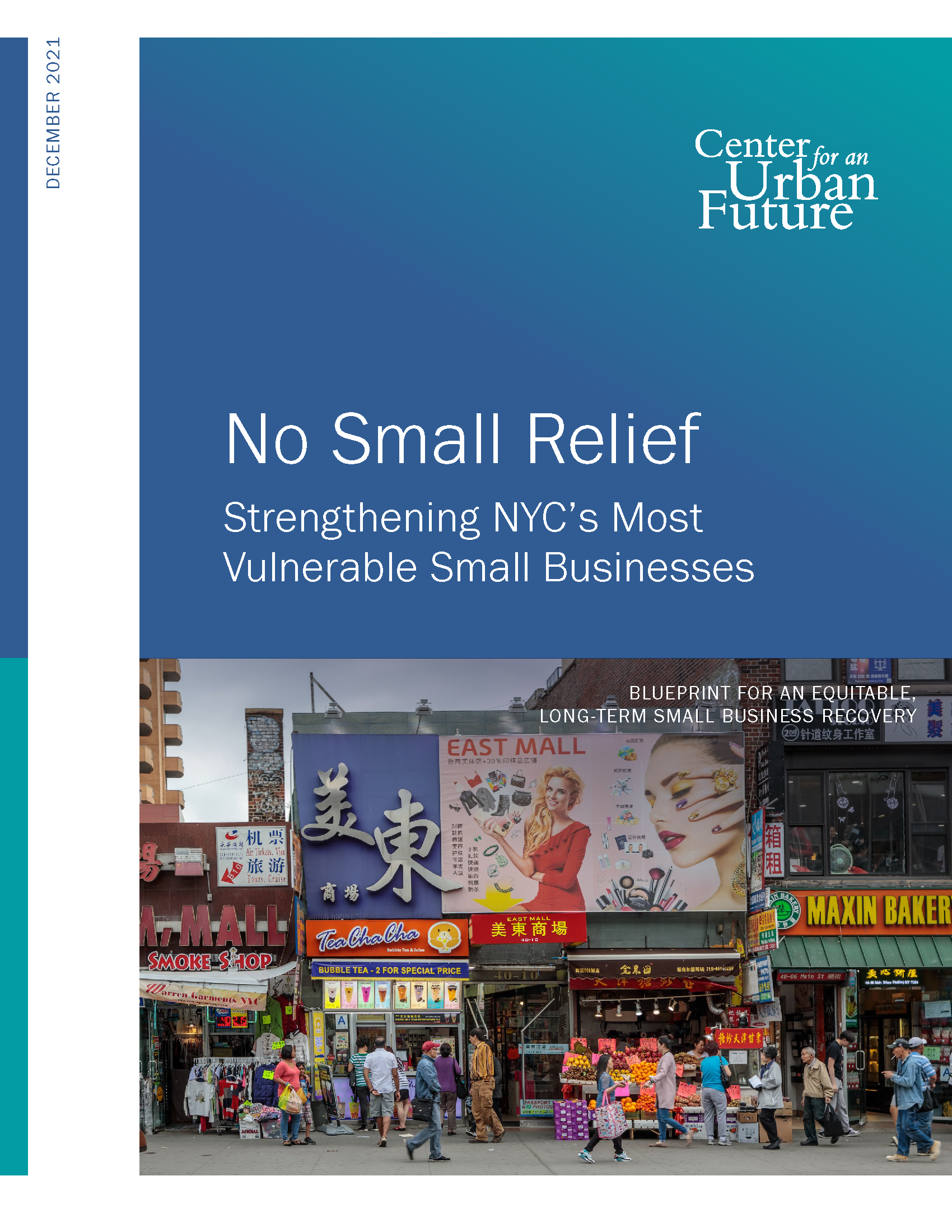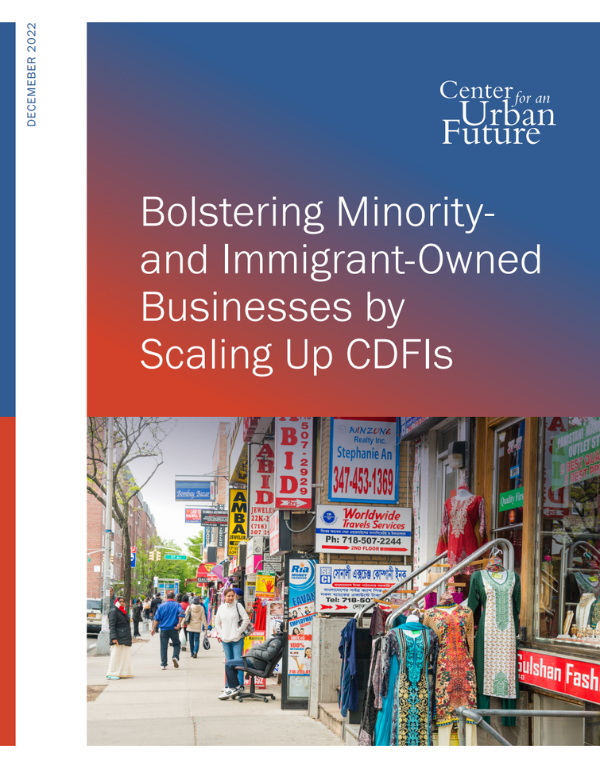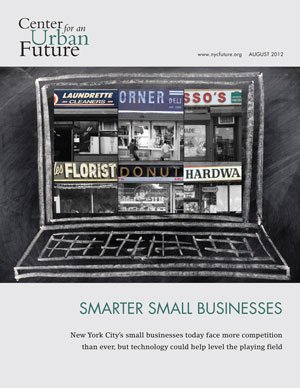New York’s small businesses are facing an existential threat from the novel coronavirus. With all gatherings cancelled, nonessential businesses closed, and residents largely confined to their homes, retail stores, restaurants, bars, arts venues, nail salons, barber shops and many other local businesses are confronting huge revenue losses. Many small businesses run on extremely narrow margins, and thousands have already been forced to shut down. Countless more are teetering on the brink. The livelihoods of owners and staff alike are at risk, threatening catastrophic consequences for neighborhoods all over the city.
New York City and State officials have already taken important steps to support small businesses, but undoubtedly more will need to be done to help these vital businesses survive this unprecedented economic crisis. To get a better sense of what should be done, we asked two dozen small business owners and small business experts for specific recommendations on how city and state policymakers could help small businesses right now. We received input from the founders of iconic New York companies like Brooklyn Brewery, Bareburger, and UncommonGoods; the individuals who led the city’s economic development agencies during the Great Recession; and the leaders of several small business assistance organizations, from the Long Island City Partnership and Hot Bread Kitchen to the Freelancers Union.
All together, we received more than 50 concrete ideas. The responses reinforce how small businesses today face urgent cash flow challenges and need support in the form of grants and loans to stabilize their finances, support their workforces, and be in a position to reopen on the other side of this crisis. Many contributors urge policymakers to consider deferring taxes, fees, and other costs that are within their control. Throughout, respondents agree that the city and state’s top priority should be delivering aid quickly and effectively, with centralized resources that are easy for businesses to navigate, and that can be accessed in days, not months.
NYC Small Business Experts’ Recommendations for Immediate Action
- Cap third-party delivery commissions
- Issue moratorium on commercial evictions
- Defer real estate, commercial rent, payroll, and sales taxes
- Ensure FEMA buys local
- Mandate insurers pay out on business interruption claims
- Make grants, not low-interest loans
- Expand eligibility for payroll grants to cover companies with 5 or more employees
- Waive utility costs for small businesses while protecting utility companies with a tax credit or bailout
- Create a program to support undocumented workers
- Subsidize difference between part-time and full-time pay and support employee healthcare
- Put artists to work
- Help businesses retain staff with low-or no-interest loans
- Ensure stimulus is delivered quickly and effectively
- Provide grants of up to $100,000 for directly affected businesses
- Provide a grant program for property owners to keep commercial tenants
- Leverage government purchasing power to support local businesses
- Lower the cost of debt servicing for small businesses
- Suspend Fair Work Week Law during crisis period
- Suspend fines, taxes, penalties, utility bills, and insurance premiums
- Automatically renew liquor licenses and permits and allow temporary licenses
- Create a fund to support small businesses that undertake deep cleanings as a result of an infection
- Enhance unemployment coverage and expedite enrollment
- Reinvigorate Small Business Development Centers
- Create state program to fund expanded paid sick leave mandate
- Set up a centralized fund to coordinate support from mission-driven lenders
- Provide online business recovery training
- Establish a centralized resource for small business to access support in multiple languages
- Create a loan pool of patient capital to incentivize long-term investment in small business
- Launch public campaign to support buying from local businesses
- Expand CDFI funding to support the financial needs of underserved communities
- Reinstate the Capital Access Program
- Expand safety net programs and fund emergency cash transfers
- Provide administrative support for businesses filing for disaster loans
- Ensure relief applies to construction slowdowns
- Include the sanitation industry in relief efforts
- Consider regulatory relief to reduce barriers for development and construction projects
This report features insights and ideas from the following individuals and organizations:
Anthony Ramirez II, co-owner of the Bronx Beer Hall
Euripides Pelekanos, founder and CEO of Bareburger
Joyce Moy, executive director of the Asian American / Asian Research Institute at the City University of New York (CUNY)
Steve Hindy, founder of Brooklyn Brewery
Seth Pinsky, CEO of the 92nd Street Y and former president of the New York City Economic Development Corporation (NYCEDC)
Cesar Claro, president of the Staten Island Economic Development Corporation (SIEDC)
Steven Grillo, first vice-president of SIEDC
Elizabeth Lusskin, president of the Long Island City Partnership
Charles Yu, senior director of business assistance at the Long Island City Partnership
Andrew Rigie, executive director, NYC Hospitality Alliance
Five-Borough Chamber Alliance
Tyler Myers, executive director of the Knockdown Center
Shaolee Sen, CEO of Hot Bread Kitchen
Robert Walsh, former commissioner of the NYC Department of Small Business Services
Liz Neumark, chair and founder of Great Performances
Samantha Berg, managing partner at Next Street
Jennifer DaSilva, founder and executive director of Start Small Think Big
Hope Knight, president and CEO of the Greater Jamaica Development Corporation
Yanki Tshering, executive director of the Business Center for New Americans
Ken Knuckles, former CEO of the Upper Manhattan Empowerment Zone Development Corporation
Rafael Espinal, executive director of the Freelancers Union
Seth Bornstein, executive director of the Queens Economic Development Corporation
Kenneth Mbonu, executive director of the Flatbush Nostrand Junction BID
James Prendamano, CEO of Casandra Properties
Larisa Ortiz, managing director, research and analysis at Streetsense
David Bolotsky, founder and CEO of UncommonGoods
Euripides Pelekanos
Founder and CEO
Bareburger
Cap third-party delivery commissions
Number one, something has to be done about third-party delivery companies and their commissions. We pay anywhere from 12 to 20 percent on all delivery orders. For the next three months or so, they should put a cap on their commissions. Maybe 7 percent.
Issue moratorium on evictions
We need a moratorium on any eviction proceeding. I’ve been asking my landlords to give me a three- to four-month deferment on my lease obligation and instead add at the end of my lease. I know my landlord has to pay their mortgage, so I’m also asking my landlords to dip into my security deposit so they can do so. It’d be helpful to get some sort of citywide policy on this.
Defer payroll taxes
I would love to have some sort of payroll tax deferment. Right now, I pay a tax on about 10 percent of the weekly payroll, but any dollars we can hold onto would be fantastic. Maybe we can hold onto that for now and work out a payment plan later. A sales tax deferment would also be fantastic.
Ensure FEMA buys local
FEMA is going to come into New York fairly soon to help manage the recovery. The FEMA workers and other first responders are going to get food stipends to go eat every day. FEMA should support local businesses, rather than get food contracts with massive food services companies.
Mandate insurers pay out on business interruption claims
The federal government should back up insurance companies. It’s the absolute fastest way to get money into the hands of companies that need it. It’s not clear that insurance companies will pay restaurants and other companies who file business interruption claims. A pandemic is not considered an act of God, which is a provision we have, but these are extraordinary times. Or the insurance companies may fight us and drag their feet before paying out, but the long delay would be terrible for us. If there was a federal mandate, they could release funds in seven to ten days.
Anthony Ramirez II
Co-Owner
The Bronx Beer Hall
Prioritize grants over loans, and expand eligibility to cover many more companies
Government should reassess the qualifications needed for small businesses to receive emergency grants. I have received applications for two programs during the recent COVID-19 quarantine: (1) No-interest loans for up to $75,0000 and (2) payroll grants for businesses with one to four employees. Interest-free or not, no business is interested in taking on loans and going into additional debt to stay afloat. Grants are preferred, but the aforementioned grant only applies to businesses with four employees or less. I think changing the qualifications to include small businesses with 20 employees would really help, especially for restaurants and nightlife businesses with a high number of part-time staff. If there were grants we could use to cover payroll, we’d be able to keep people employed during this crisis rather than laying everyone off and running the risk of losing employees when we’re able to reopen.
Waive utility costs for small businesses while protecting utility companies with a tax credit or bailout
Government should offer a tax credit or bailout to utility providers that waive charges to small businesses. Our largest bills are Con Ed and insurance, but we also have to pay for water and internet. Not having to pay utilities or insurance for three months—especially because we are not operating at full capacity—would help us make it through the quarantine and survive the next few months.
Suspend rent collection during the quarantine
Government-owned buildings should suspend rent/mortgage payments. Government should also provide property tax relief so private building owners can afford to waive rent collection from small businesses during the quarantine.
Suspend sales tax collection
Government should suspend the collection of sales tax. Our quarterly sales tax was due this past Friday (March 20, 2020) and we paid on time, but it reduced our bank account by more than 60 percent. That’s a significant amount of money that could have been used for payroll, rent, and utilities. I understand that New York City needs the money, but if we’re forced out of business there won't be any sales tax to collect in the future.
Create a program to support undocumented workers
The Bronx Beer Hall does not employ undocumented workers, but many restaurants in New York City do. They are an important part of the workforce and New York City will need them back at work once things return to normal. Workers that rely on "off the books" and cash payments will be devastated by the quarantine and should receive the same level of assistance as documented workers. They need to survive this crisis too.
Joyce Moy
Executive Director
Asian American / Asian Research Institute
City University of New York
The two biggest financial challenges that small businesses, particularly mom-and-pop businesses (many of which are immigrant-owned businesses like restaurants, cleaners, and grocery stores) face are payroll and rent.
Defer real estate taxes from April to September
Real estate taxes are generally passed onto the tenant. These should be waived by the city for the next six months, and the unpaid amount should be capitalized over the following 12 months (i.e., no real estate taxes due for the months of April through September, and that amount added to the balance for the subsequent 12 months of real estate taxes). No penalties or interest should be accrued on the first six months of real estate taxes paid in this fashion.
Defer rent payments from April to September
Ask all New York City landlords to waive rent collection from April through September and add the unpaid amount to the balance paid over the ensuing 12-month period. The New York State and New York City governments could give landlords an income tax credit for having done so. The other possibility is that the city or state could offer guarantees for the unpaid amount of rent for three to six months to landlords who agree to postpone six months of rent collection.
Provide $5,000 grants for rent or payroll
New York State could offer $5,000 grants through the Small Business Development Centers for rent payment or payroll, where the SBDCs evaluate the criteria. Alternatively, they could offer loans of up to $25,000 with zero percent interest rates. Collateral requirements should be waived.
Defer commercial rent tax for 6 months
For some of the larger small businesses, waive collection of commercial rent tax for the next six months, with the unpaid amount spread and paid over the subsequent 12 months.
Steve Hindy
Founder
Brooklyn Brewery
Subsidize difference between part-time and full-time pay and support employee healthcare
Possible measures to assist small businesses include:
- No-interest loans to provide short-term relief for rent, etc.
- Government subsidies for part-time work: if a company brings back X workers at half-time, government subsidies make them whole. (Some of our partners in Europe are doing this.)
- Government support for employee health care.
- Unemployment benefits expedited.
Seth Pinsky
CEO, 92nd Street Y; Former President, NYCEDC
Put artists to work
At a time when people are socially isolated and there are few diversions, we should take advantage of the many artists that are out of work and the cultural institutions that are shuttered and have the government pay them to produce content that will bring a little light into people’s otherwise dark lives.
Help businesses retain staff with low-or no-interest loans
Government should focus its resources on keeping people employed by small- and medium-sized businesses. I would do this through a forgivable low- or no-interest loan program that would cover personnel costs up to some per employee cap, so that businesses can keep their workforces on the payroll, thereby eliminating some of the uncertainty that people are feeling in their financial lives. I would recommend this over cash payments, because such lump sum payments help individuals once, but do not give them confidence that there is a sustainable path forward for them, which staying in one's job does accomplish.
Cesar Claro
President
Steven Grillo
First Vice-President
Staten Island Economic Development Corporation (SIEDC)
Ensure stimulus is delivered effectively and rapidly
In recent conversations with SIEDC’s member businesses, several things really stand out. First, there is a major question mark over the actual timing and delivery of the stimulus and assistance promised so far. A trillion-dollar spending package is exciting news, but what will the actual timing of delivery be? There are practical questions that remain unanswered: Who is accepting applications for assistance? How long will they take to process? These are the real-world questions. With everyone working from home this could take even longer. The White House and Congress—and state and local officials—need to provide guidance not just on the total dollar value but the timing and mechanics.
Provide grants of up to $100,000 for restaurants
Second, the restaurant industry is at the center of the crisis and facing a really dire set of circumstances. Restaurants are cash-in, cash-out businesses—everything is spent straight away. The $75,000 promised by the state is a good start but completely insufficient. Most restaurants are floating $100,000 in “healthy” debt at any time, and suddenly that isn’t very healthy. An associated question is: who is it that restaurants are paying? Banks? Suppliers? There need to be serious discussions with restaurant owners to understand what the crisis is going to cost them and what amount would actually be enough to keep them afloat. Many owners have used personal assets, such as their houses, as collateral, and so they really could lose everything.
We are likely to find that restaurant businesses are hundreds of thousands of dollars short. A $100,000 cash infusion to a restaurant would be the only way to assuage some of these issues. That’s a large amount of money, but realistically that’s what’s needed to keep the industry afloat. Yesterday an SIEDC member said that he’s had to return $35,000 in event deposits for the spring, and he still has $100,000 outstanding in deposits that people are asking to be returned. But he doesn’t have it, because the deposits have been spent. He would return money if he could, but the cash flow isn’t there. Financial assistance has to be in the form of government grants: banks won’t be willing to loan money. Some businesses are cash positive and may be able to survive, but others won’t.
Provide a grant program for property owners to keep tenants
Another group particularly exposed are large property owners, who face a huge pinch where their tenants can’t pay rent. They want to keep their tenants in, but they also need to pay their bills and taxes. For instance, one Staten Island business has 40,000 square feet of space but zero rent as the major tenants can’t do business. Likewise, another seven-story building has 50 percent tenancy. One of the worst things we could do is retard the reentry of businesses when things return to normal. We don’t want people to have to renegotiate leases; we want them to be able to turn the lights on and get back to work. A grant program that helps larger property owners to keep business tenants in place while they cannot pay rent would be really interesting.
Mandate insurers pay out on business interruption claims
Finally, there is a major question about business interruption insurance. All businesses have insurance for interruptions like terror events and floods, but somehow, despite the National Guard being deployed and people being ordered to stay in their homes, the current crisis isn’t covered under most insurance contracts. The White House or Albany needs to step up and demand that this crisis count as an event of similar magnitude that would allow people to get insurance claims paid out. Businesses are asking the legitimate question: What is the difference between this event and a terror event or other major disaster?
Elizabeth Lusskin
President
Charles Yu
Senior Director of Business Assistance
Long Island City Partnership
Make responses simple and rapid
Keep any aid simple to apply for and quick to receive. Otherwise businesses will be out of business before they can get help.
Delay collection of taxes and fees and provide bonus depreciation
Bring the New York State Department of Taxation and New York City Department of Finance to the table. Most small businesses interact with the government through the Department of Finance (or its state/federal equivalent), but the agency is often not the owner of the assistance programs during this crisis. Some of the suggestions that they have control of or a role in include:
- Defer income tax payments for small businesses.
- Allow a bonus depreciation for small businesses.
- Completely or partially waive/defer payments on tickets, violations, and summons, etc.
- Waive any late charges and fees.
- Allow businesses to defer New York State Insurance Fund premiums.
Leverage government purchasing power to support local businesses
State and city governments can buy more things at this time from local businesses and pay vendors more quickly. For example:
- Accelerate the payment of existing procurement contracts for small business vendors.
- Move some of the purchases for later in the year up to now.
- Move some of the projects/contracts for later in the year up to now, things like paving roads, infrastructure maintenance, etc. (though obviously not the bigger contracts).
- Temporarily increase the threshold on procurement contracts that do not require an RFP to help accelerate the awarding of contracts.
Lower the cost of debt servicing for small businesses
Governor Cuomo already issued guidance for banks and lenders to encourage them to lower monthly loan payments for businesses. The governor should look into temporarily putting specific recommendations of this guidance into law, for example:
- Offering payment accommodations, such as allowing loan borrowers to defer payments, extending the payment due dates or otherwise adjusting or altering terms of existing loans, which would avoid delinquencies and negative credit agency reporting.
- Waiving overdraft fees.
- Easing credit terms for new loans.
- Waiving late fees for loan balances.
Government should also look into ways to lower the cost of refinancing existing debt (e.g., mortgage recording tax waiver, special one-time deduction on cost of refinancing rather than amortized) to encourage refinancing of existing debts to help lower monthly payments. Additionally, some kind of payment accommodation plan on commercial mortgages would give landlords more room to work things out with tenants on rent.
Andrew Rigie
Executive Director
NYC Hospitality Alliance
The New York City Hospitality Alliance has published a Restaurant Rescue and Save Nightlife Plan in response to COVID-19. The recommendations include:
Cap delivery fees to support continued food supply
The governor and mayor should mandate that fees charged by third-party delivery platforms to our local restaurants be capped at a maximum 10 percent of the order. Currently, third-party delivery fees usually range from 15 percent to 30 percent or more of a total order and would therefore amount to a windfall during this emergency when restaurants can only offer takeout and delivery. Many restaurants lose money on their deliveries during normal market conditions. We must preserve some profit for restaurants so they can serve New Yorkers who need food during this crisis and allow some employees to earn a paycheck. Restaurant takeout and delivery are a vital part of the city’s food supply chain.
Suspend Fair Work Week Law during crisis period
New York City’s Fair Work Week Law requires certain restaurant employers to provide employee schedules two-weeks in advance and levies significant penalties for shift cancellations and modifications of hours within that time frame. Now that restaurants are forced to close or limited to take-out and delivery only, requiring a significant reduction in the need for employees, these requirements must be suspended.
Suspend fines, taxes, penalties, utility bills, and insurance premiums
Suspend the payment of all insurance premiums, utility payments, and fines, and provide cure periods to businesses for violations that do not pose an immediate hazard to the public and workers. All taxes, fees, premiums, and fines should be suspended indefinitely until a thorough and thoughtful strategy can be implemented to address these payments. This includes but is not limited to sidewalk café consent and liquor license renewal fees. Suspend the Commercial Rent Tax and property tax passthroughs on ground floor tenants like eating and drinking establishments. In addition, government should protect against a spike in premiums related to COVID-19.
Automatically renew liquor licenses and permits and allow temporary licenses
All licenses and permits such as liquor licenses, sidewalk café licenses, Health Department permits, etc., should renew automatically without the payment of licensing fees until a strategy can be implemented to responsibly reopen such operations. They cannot afford thousands of dollars in licensing fees if they are closed.
Governor Cuomo should use his emergency powers to give the State Liquor Authority (SLA) the authority to permit businesses to open with a temporary license in New York City while their applications are going through the lengthy backlog at the SLA—like they do for applicants elsewhere in the state. This issue is acute now that state employees are being sent home. Once this crisis is over, we need new businesses to open fast. They cannot then be waiting for a license to be issued.
Five-Borough Chamber Alliance
The Five-Borough Chamber Alliance—including the Chambers of Commerce of the Bronx, Brooklyn, Manhattan, Staten Island, and Queens—released an open letter to policymakers with recommendations to support small business in response to the outbreak. The recommendations include:
Suspend New York State sales tax for six months and reduce business income tax by half for 2020
Expand the city’s proposed no-interest loan program to include more small businesses
The city should extend program eligibility to all small businesses with fewer than 100 employees and a quarterly decline in revenue, and increase the maximum loan amount to $250,000. In addition, the city should create a targeted no-obligation grant program for businesses that are required to close.
Create a fund to support small businesses that undertake deep cleanings as a result of an infection
Waive sidewalk café consent fees and place a moratorium on other fines
In addition to waiving these fees, the city should eliminate the 18 percent annual interest rate imposed on restaurants that opt to pay in multiple installments and suspend all non-health-related business violations and fees.
Tyler Myers
Executive Director
Knockdown Center
Enhance unemployment coverage
Enhanced unemployment coverage is the primary matter. We have lost more than $1.5 million, or around a quarter of our annual revenues, so far, and will likely lose much more. This puts us in a position where we cannot protect our 180 staff members from drastic changes in their lives relative to their ability to sustain their lives as they were. Ensuring easy and quick access to unemployment payments, we feel our staff will have a much greater likelihood of being available for us to get back to work as quickly as possible, whenever that is. Our path to helping the economy of the city, state and country involves staying in a position where we are ready to operate as soon as it is safe and prudent to do so. Our staff will be key to ensuring a speedy return to creating wages and economic activity for our vendors and partners.
Shaolee Sen
CEO
Hot Bread Kitchen
Forgive rent and utilities immediately
A first idea would be rent and utilities forgiveness during the period of social distancing and closures of non-essential businesses.
Roll out the SBS grant covering 40 percent of payroll costs immediately
The SBS website currently has a form on its website saying it will cover up to 40 percent of payroll costs for up to two months, which is a meaningful and fantastic policy. But in reality, all that is available is a form on the website saying that they will contact the business owner when applications open. SBS needs to open up a hotline and do immediate remote intake and get funds into accounts.
Small businesses and the hourly workers they employ, particularly in food, which makes up 70 percent of the city’s small business sector, don't have access to safety nets. Half of all small businesses have less than a month's worth of cash buffer, and we know hourly workers in particular are operating paycheck to paycheck and struggle to come up with $400 for an emergency. Time is important here, and there needs to be an active emergency relief effort to get these funds out.
Make grants, not low-interest loans
Zero-percent loans or loans of any kind are not the right solution right now. Loans are useful when we anticipate a period of recovery and growth; right now, we are living in such uncertain conditions we need to provide relief. Period. Businesses are living in fear of the debt that’s piling up on bills they can't pay, people they have to lay off, and cancelled events and contracts for revenue they were counting on. And we don't know yet when recovery can begin. We need to buy a little time to take care of businesses and their employees’ basic needs before we can expect them to start planning for a new future.
Be prepared to invest heavily in recovery
This crisis is very different from the past small business crises we have seen over the last 20 years. Food businesses have been living on unprecedented margins with rising minimum wage and leasing costs already; there is going to be no incentive to open up shop when you can lose everything overnight and don't have a cushion to restart.
This isn't the same as recovery in past cycles of New York when we have seen the destruction of a neighborhood or a geographically concentrated locale that has a ripple effect through the city; the complete widespread nature of this pandemic is what is so alarming.
New York City and State in particular, which value small business as a part of diversity in neighborhoods, as community, and as a way of life, have to come up with ways to back the risk of starting or opening small businesses. This has to be a priority at the neighborhood and city level; the stakes are so high for entry and the incentives and insurance mechanisms just don't exist yet.
Robert Walsh
Former Commissioner
NYC Department of Small Business Services
Make it (much) easier to navigate government
After 9/11, Mayor Mike Bloomberg created the Department of Small Business Services (SBS) to better serve NYC’s 200,000 small businesses. He went on to eliminate the Department of Employment and merge job placement and business development services under one roof at the new agency. In these times, to quickly help small businesses and entrepreneurs get back on their feet and grow their businesses, the mayor should consolidate the “business” units of the Department of Consumer Affairs with SBS to create a much more streamlined agency with less bureaucratic obstacles. A greater emphasis would be placed on new or existing businesses and pointing them in the right direction for a wide array of services. It is long overdue and will also help streamline the City’s permitting process and complete efforts to establish a one-stop online tool for businesses.
Get New Yorkers back to work
Over the years, one-stop employment and training centers have been revamped, with more emphasis on targeting growing economic sectors. The Center for an Urban Future has called for stronger ties with colleges and universities (with a focus on the City University of New York [CUNY]) for training and development. With a new CUNY chancellor and a workforce development dean who fully understands the system, coupled with the urgent need to get New Yorkers back to work, the time is now for the state and city to develop a well-thought-out comprehensive workforce development plan that can be quickly executed. There are more than enough studies and ideas on this topic; execution is the hard part.
Place emphasis on capital access
Where’s the money? NYC Business Solutions Centers have done a good job in helping entrepreneurs start or grow a business. New programs were developed with the Kauffman Foundation, Columbia University, NYU and others. The mayor needs to reenergize the Banking Advisory Council with a greater emphasis on getting much more capital in the hands of small businesses. A gap in access to credit for small business exists—and is particularly persistent in small dollar loans (under $250,000). This is the working capital our small businesses will need to get up and running. Smaller loans are considerably less profitable and therefore less appealing; many of the larger banks need to be more active in providing Small Business Association loans. The mayor needs to use the bully pulpit to get the traditional banks to place a far greater effort in lending to small businesses.
Reinvigorate Small Business Development Centers
Aside from a few exceptions (e.g., Pace University and Columbia), I found that most of the other New York Small Business Development Centers (SBDCs) are disappointing, underwhelming, sleepy, tired, and simply not fully leveraging the resources of a college/university environment. They can often be found tucked away on college campuses with little visibility or interaction with startups, entrepreneurs and small business owners. The SBDCs are administered by the State University of New York—and funded by the U.S. Small Business Administration. It is time for the governor to take a fresh look at this program, with an eye on expanding it, forging public-private partnerships with financial institutions, and encouraging the leadership of many more colleges and universities to engage and open up new centers that provide hands-on experience for students, faculty—and most important great access to capital for small businesses. A real game-changer would be to move the Centers under the leadership of the Empire State Development Corporation.
Robert Walsh’s segment, “The Bottom Line for Small Business,” can be heard on 1010 WINS.
Liz Neumark
Chair and Founder
Great Performances
Expand small business grants to cover businesses with 5 or more employees
New York City is offering small businesses with fewer than five employees a grant to cover 40 percent of payroll costs for two months to help retain employees. The city should expand the grant to cover small businesses that employ five or more workers. Mid-sized companies are not adequately covered.
Create state program to fund expanded paid sick leave mandate
New York State just issued a paid sick leave act for those who are infected by the virus and those who are quarantined due to exposure, requiring businesses to pay 14 days of sick leave. The sick leave should be funded the same way Paid Family Leave is covered—through an insurance policy similar to state disability benefits. This is especially critical for businesses that continue to serve the population, such as groceries, caterers (like us, providing emergency relief meals), and of course, health care workers. The cost of this burden on small and mid-sized businesses during this time is staggering.
Samantha Berg
Managing Partner
Next Street
Set up a centralized fund to coordinate support from mission-driven lenders
The grant program and loan programs being rolled out by the NYC Department of Small Business Services are a great start. However, with 228,000 small businesses in NYC, we need to do more to support and leverage existing resources that exist within the city. One example is setting up a small business response fund for mission-driven lenders (e.g., Community Development Financial Institutions) to support their borrowers, provide payment deferrals and forgiveness programs and offer direct technical assistance.
Provide online business recovery training
Another example is resiliency and recovery capacity training (online, of course). This training would cover business plan restructuring, bill payment relief, financial and tax advice, marketing strategies, legal support for contract negotiations, and more.
Establish a centralized resource for small business to access support
Lastly, there are a lot of different companies, foundations, banks, and others that have offered up support. It would be great to have a centralized shared resource for everything that small businesses can access. This could be a platform with a website front end so that people can post their updates, but it also needs someone to monitor the information and ensure no bad actors get on and promote predatory services.
Jennifer DaSilva
Founder and Executive Director
Start Small Think Big
Pause loan repayments, rent payments, and taxes
Cities and states can and should consider pausing debt collections, rent, evictions/foreclosures, and extending benefit periods. Suspension of sales tax payment or delay of due dates for quarterly submission should also be considered. This will provide liquidity and relief to businesses closing due to the outbreak.
Businesses are experiencing a cash flow shock—sales are collapsing, even as some expenses (e.g., payroll/rent/loan payments) stay the same. Assuming this pandemic will pass, and normalcy resumes in three to six months, what is needed is some cash flow breathing room (with governments/creditor intervention) during this period.
Measures could include:
- Federal/state/local entities providing working capital loans to small businesses that can then be repaid over a longer time.
- Three-to six-month 'no penalty' deferrals on existing term loan payments that can then be repaid at end of prior term loan. For example, defer loan payments for six months on existing five-year loans, but the five-year loan period gets either extended to five years and six months to allow payment at end of term or monthly payments change on resumption of payments to reflect deferrals.
- Six-to twelve-month deferral on Federal/State/local taxes due on April 15.
Hope Knight
President and CEO
Greater Jamaica Development Corporation
Create a loan pool of patient capital to incentivize long-term investment in small business
I think that if a forbearance on small business loans, commercial rent and/or real estate taxes, etc., is created, it would be very helpful for businesses. There also needs to be a loan pool of patient capital for small businesses to access. It is going to be a long haul back and there needs to be very flexible terms on any loan to a small business if it is going to be useful for getting businesses back online.
Yanki Tshering
Executive Director
Business Center for New Americans
Provide more merit-based micro loans from the Small Business Administration
My experience has been that so far, the most effective response in emergency situations has been from the federal government via the Small Business Administration (SBA). They have already announced some relief in the form of loan deferments and loan modifications for businesses with SBA Community Advantage Loans. These tend to be larger loans, so we are so relieved for our clients who have loans in the $250,000 range.
It seems there is more relief in store from the SBA for our clients who received SBA-funded microloans—loans of up to $50,000. These loans are to micro businesses and very often the businesses that cannot afford to have more than two to three months of poor sales. The SBA operates quickly, and everything is merit-based—no politics! We just cannot express how much we appreciate the SBA.
Roll out interest-free loans quickly and effectively
Mayor Bill de Blasio has announced that interest-free loans up to $75,000 and grants for small businesses will be available. This is amazing, but as my kindergarten teacher Kate Rogers would say, "The proof is in the pudding!" If city government can pull this off, that would be fantastic.
Launch public campaign to support buying from local businesses
I don't understand why one needs their items like toilet paper delivered by Amazon Prime—except perhaps older people afraid to go to a store in case they get infected. We need to support our businesses by making our purchases from them during these difficult times for all the mom-and-pop shops. We should start a city-wide campaign to support this idea.
Expand CDFI funding to support the financial needs of underserved communities
Regarding state government, a few months ago Governor Cuomo announced a proposal to provide $25 million over five years to fund Community Development Financial Institutions (CDFIs) to support the financial needs of underserved communities in New York State. This is a perfect opportunity to test this idea with a greater level of funding.
Reinstate the Capital Access Program
One more way for Governor Cuomo to support the increase of low-cost capital to small businesses is through loan loss reserves. Until earlier this month, New York State had a program which provided a 5 percent match to lenders like the Business Center for New Americans (BCNA) for loan loss reserve for loans made to micro and small businesses. For example, if we made a $50,000 loan to a business, New York State would provide $2,500 in loan loss reserve, which we had to match with an equal amount. CDFIs like Business Center for New Americans kept these funds in reserve, and if loans defaulted, we could use these funds to cover our losses. This Capital Access Program (CAP) was very suddenly shut down earlier this month. This is a good time for the state to reinvest in CAP.
Cover personnel costs
We love the idea that NYC is offering 40 percent of personnel costs to businesses for two months. Any cash payments to help the businesses to keep their employees is appreciated. It is a financial but also a great psychological benefit to small businesses.
Ken Knuckles
Former CEO
Upper Manhattan Empowerment Zone Development Corporation
Provide $50,000 grants to small businesses
For small businesses with gross annual revenue of under $1 million, I think the city and state should offer grants of up to $50,000, for specific business operations like payroll or inventory. For businesses with gross annual revenue of between $1 million and $5 million, l would offer interest-free loans, for the above-stated purposes, in amounts deemed feasible by the appropriate agencies.
Defer taxes for two quarters
I would also recommend that the city and state consider a temporary tax deferral program over the next two quarters, in order to assess the impact and duration of the current crisis.
Rafael Espinal
Executive Director
Freelancers Union
Expand safety net programs and fund emergency cash transfers
Independent workers and small businesses are in need of immediate relief. I think this is how we help:
- Zero-interest loans available to small businesses from all levels of government.
- Expanded emergency unemployment insurance for workers.
- Self-employment and business tax relief.
- Emergency cash that goes beyond the proposed $1,000.
Seth Bornstein
Executive Director
Queens Economic Development Corporation
Provide administrative support for businesses filing for disaster loans
There is an issue with the U.S. Small Business Administration (SBA). SBA disaster loans require attachments (some signed). In the past (for instance, after 9/11 and Hurricane Sandy) there were offices where our clients who didn't have printers/scanners could come—and there still are small immigrant businesses who do most of their work on their phone and on outdated equipment. Now, with all business provider offices closed, it is a potential issue. We can’t have protocol get in the way of obtaining aid.
Kenneth Mbonu
Executive Director
Flatbush Nostrand Junction BID
Provide interest-free loans to cover commercial rent payments
Commercial rent is usually the largest expense for most small and micro retail businesses. Providing an interest-free, government-subsidized loan with a 60- to 90-day window to start repayment on the loan would help. The loan should cover 70 percent of the commercial rent payments for three months. Initiate tax incentives with landlords for the remaining 30 percent rental income be a tax deduction. This would help address cash flow challenges and prevent retail vacancies.
James Prendamano
CEO
Casandra Properties
Provide equal relief for commercial tenants and landlords
First, on the real estate side: the crisis started with bars and restaurants being required to close during normal business hours as they shifted to take-out only. These businesses are the heart of shopping centers and commercial districts. Now with the governor’s order extended to all non-essential businesses, tenants have already begun to reach out to express their inability to pay rent. While there is talk about rent abatements/subsidies for the commercial markets, and they certainly will be required—as many retail tenants, both corporate and mom-and-pop, went into this crisis teetering on the brink of closure—it is important to follow the dominos as they tip. The immediate and next thing we will see are landlords unable to pay their bills, including mortgages, real estate taxes, insurance, and general carrying costs if receiving significantly diminished income. Many landlords are operating on 7 to 10 percent profit margins based on cap rates. Consider the impact of even half the tenants not paying rent, which currently seems like an optimistic scenario given my conversations in the industry to date. This can potentially trigger widespread defaults on commercial loans.
It is our understanding that the governor has called for a moratorium for three months on evictions and foreclosures. The reality on the ground is that foreclosure proceedings and evictions are an extremely lengthy process in New York. I have heard some suggestions that real estate tax abatements or credits may be offered to help offset losses. The issue is that in many cases these are triple-net leases, which means the tenants are already paying the real estate tax. This would offer the landlord no relief with their mortgage payments. Additionally, real estate taxes get calculated based on a cap rate applied by the city. The tax rate is entirely dependent on the occupancy level and income of the center. Widespread vacancies will drop the real estate taxes automatically. In light of the well-documented retail crisis, in many cases margins have become incredibly thin over recent years and without a mechanism to protect the landlord against all lost revenue, many won’t be able to endure.
I suggest a comprehensive rent relief/subsidy for tenants forced to close their doors for the proposed three-month period or whatever that period ends up being. However, there needs to be a commensurate deferment and subsidy for landlords on their mortgage payments, lost rents, and expenses. This would allow the government to focus on supporting the banks to bear these costs, rather than having to intervene with all the individual landlords. The above can easily be verified by previously filed real property income and expense (RPIE) statements, tax returns, and tax protests. I believe the industry is not seeking a free pass, but whatever is being offered for tenants needs to be offered in lockstep for landlords. That would help keep the industry calm and businesses reassured, and would offer a much more simplified process for the government to undertake.
It’s also important to recognize that, whenever the period of disruption ends, things won’t ramp back up straight away. There will need to be a phased reintroduction at the end of any relief period where tenants can start to repay deferred rents and taxes, for instance over five months. The same, again, should apply to landlords where mortgage payments have been deferred and the rent subsidy can burn off at the same rate of the phase in. This will incentivize landlords and tenants alike to continue to invest in their assets/businesses as we understand things will not recover overnight.
Ensure relief applies to construction slowdowns
Then there is the business side of the real estate industry—attorneys, real estate agents and brokers, builders, contractors, subcontractors, title companies, etc. The current $75,000 loans offered by the Department of Small Business Services are structured to help businesses that measure sales in a point of sale manner, meaning it is very easy to quantify if sales are up or down on a day-to-day basis. The nature of all of the businesses in the real estate industry is that you must continue to invest in your business as the work gets done but payment does not come until much later in the process. Businesses in this industry are faced with the unique challenge of having to continue to invest in the business and deplete savings, when savings even exist, when it is impossible to forecast when real estate transactions will close, development projects will be completed, etc.
The impact is going to be devastating. Many industry businesses endured a similar process after Hurricane Sandy where it was impossible to quantify the daily losses in the same way as other industries. Perhaps the city can offer loans for this industry that are a simple function of gross sales or gross expenses as compared to last year’s sales and/or expenses. This would make these industries eligible for relief today and would go a very long way in instilling confidence in these small businesses.
Include the sanitation industry in relief efforts
Businesses that have been deemed essential and are remaining open are also being negatively affected and can easily be overlooked in the government response. Private sanitation, for example, is an essential service. Collection services must continue, crews need to keep running their routes. However, some of the customers in this industry are retailers and other businesses that are shutting down or operating at reduced levels. Clearly sanitation services must stay in place. In many instances these businesses carry significant overhead and the proposed $75,000 loans are not nearly sufficient to cover expenses during this period of lost revenue. Again, perhaps these loans can be made available and the size of the loans would be directly tied to historical sales.
Consider regulatory relief to reduce barriers for development and construction projects
As we emerge from this crisis, there need to be incentives in place to keep the real estate industry moving and to jumpstart investment again. This can be as simple as expediting planning approvals and reducing some of the regulatory barriers to getting projects over the finish line. The regulatory barriers that exist in normal times become even more difficult to manage during a crisis when businesses are deciding where to prioritize their efforts and investments. Reducing these regulatory barriers can be a powerful signal and incentive for these businesses to keep projects in the pipeline. The revenue created through real estate investment is well documented. Mortgage tax, transfer tax, sales tax, payroll tax, etc. will be more crucial for the government than ever. Supporting efforts to bring projects through the process in a timely manner will prove vital.
Larisa Ortiz
Managing Director, Research and Analysis
Streetsense
Provide crucial, up-to-date information to small businesses, distributed in multiple languages
There have been numerous efforts at the local and state level to help businesses affected by the coronavirus. Yet despite the unprecedented and rapid marshalling of resources and tools, many small business owners remain in the dark about how to access these resources, as well as how to navigate the breakneck speed at which the regulatory landscape, not to mention shopper spending habits, are changing around them. In a city well known for its immigrant entrepreneurs, the fact that much of the current information is in English means that help is not reaching the audience who needs it most—the “essential businesses” that include countless bodegas, convenience stores, and restaurants that are part of the city’s vast food supply chain. Overcoming this information gap must be a priority. A small business survival “fact sheet”—available online and in print filled with practical ideas and resources, from tips to how to keep a store sanitized to a checklist of items that will have to be addressed from insurance to taxes, should be distributed in multiple languages through existing small business support mechanisms, including the NYC Department of Small Business Services and their network of business improvement districts and merchants associations city-wide. With special thanks to Meredith Phillips Almeida, former Executive Director of the Myrtle Avenue BID and founder of “Professionals Assisting the NYC Business Community during COVID-19” Facebook page.
David Bolotsky
Founder and CEO
UncommonGoods
Provide funding for companies to maintain employment
The biggest help I can imagine would be to get companies funding in order to be able to employ workers during a shutdown. I have heard that this may be done through the form of loan forgiveness to businesses, which I could see working. A second idea would be rent relief—i.e., businesses would not have to pay rent during a shutdown. This would require some form of relief for landlords as well.














